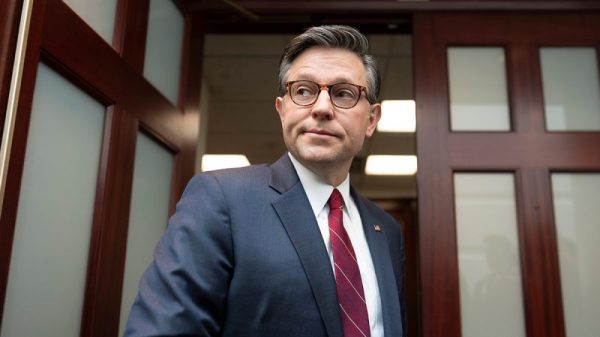A Republican-led House committee summoned the leaders of Harvard University, the University of Pennsylvania and MIT to Capitol Hill on Tuesday for a scalding critique of their efforts to stop antisemitism on their campuses since the eruption of war in Israel and Gaza.
“Today, each of you will have a chance to answer to and atone for the many specific instances of vitriolic, hate-filled antisemitism on your respective campuses that have denied students the safe learning environment they are due,” Rep. Virginia Foxx (R-N.C.), chairwoman of the Education and the Workforce Committee, told the university presidents.
The hearing cast a spotlight on presidents Claudine Gay of Harvard, Liz Magill of U-Penn. and Sally Kornbluth of MIT — and on tensions that have flared at their campuses and elsewhere in the weeks since Hamas launched a surprise attack Oct. 7 that killed about 1,200 people in Israel.
Israel-Gaza war
End of carousel
The ensuing Israeli military campaign against Hamas has caused calamitous destruction in the densely populated Palestinian enclave of the Gaza Strip. The Gaza Health Ministry calculates the death toll at more than 15,000.
Many college and university leaders have searched for the right words and actions to comfort their communities since the war began. In the initial days, some also were scrambling to coordinate help for students and faculty members who may have been traveling in Israel and the Palestinian territories or were based there.
On campus, antisemitism is not the only concern for these leaders. They also are seeking to prevent Islamophobia and other forms of bias and hatred while safeguarding freedom of expression for faculty members and students in a time of vigils, demonstrations and confrontations.
“I know many in our Harvard Jewish community are hurting and experiencing grief, fear and trauma,” Gay told the committee. “I have heard — from faculty, students, staff and alumni — of incidents of intimidation and harassment. I have seen reckless and thoughtless rhetoric shared — in person and online, on campus and off. I have listened to leaders in our Jewish community who are scared and disillusioned.”
Among the steps Harvard is taking, Gay said, the university is increasing security in student residences and other campus spaces and launching a “robust program” of training for students, faculty members and staffers on antisemitism and Islamophobia. “We will not cease our work until all members of our community feel safe and respected so they can learn and thrive,” she said.
Magill and Kornbluth also pledged efforts to stem religious hatred.
“I have condemned antisemitism publicly, regularly, and in the strongest possible terms,” Magill said. “And today, let me reiterate my and Penn’s unyielding commitment to combating it.”
“As an American, as a Jew, and as a human being, I abhor antisemitism, and my administration is combating it actively,” Kornbluth said. She said campus initiatives also will address rising Islamophobia. “MIT will take on both, not lumped together, but with equal energy and in parallel,” she said.
Lawmakers posed pointed questions about student safety and university discipline.
“Will the students who are intimidating Jewish students just because they’re Jewish be expelled?” Rep. Lisa C. McClain (R-Mich.) asked Gay.
“You’re describing conduct that sounds like it would violate our policies against bullying and intimidation and harassment,” Gay replied.
McClain pressed on another incident. “I’m looking for an action item. Yes? No? Was anybody expelled?” But Gay declined to be pinned down, citing privacy rules.
“We hold our community to account,” Gay said.
At another point, Rep. Glenn Grothman (R-Wis.) told Magill: “I have a friend whose son goes to University of Pennsylvania. Right now, he is physically afraid to go to the library at night. Okay? Just unbelievable.” He demanded to know “why today a Jewish student is afraid to walk to the library at night?”
Magill replied, “Congressman, let me start by saying I’m devastated to hear that. And the safety and security of our campus and our students in particular is my top concern.” She asked Grothman if she could speak with the parent.
Rep. Elise Stefanik (R-N.Y.) asked the presidents about the limits of free speech. “Does calling for the genocide of Jews violate Harvard’s rules on bullying and harassment?” she asked.
“Calling for the genocide of Jews is antisemitic,” Gay replied. “And that is antisemitic speech. And as I have said, when speech crosses into conduct, we take action.”
“So is that a yes?” Stefanik asked.
“When speech crosses into conduct, we take action,” Gay repeated.
Republicans also pushed the university leaders about the role of faculty.
“The antisemitism we’ve seen on your campuses didn’t come out of nowhere,” Foxx said. “There are cultures at your institutions that foster it because you have faculty and students who hate Jews, hate Israel and are comfortable apologizing for terror. How did your campuses get this way?”
Gay replied, “Again, antisemitism has no place at Harvard. When we recruit faculty, we do so with the understanding that they are joining a community where we honor, celebrate and nurture open discourse both on the campus and in the classroom. And to be a successful teacher and educator at Harvard requires the ability to draw out all of the viewpoints and voices in your classroom, irrespective of one’s political views.”
Democrats said they, too, want to prevent antisemitism and Islamophobia. They urged Republicans to support Biden administration efforts on that front, particularly at the Education Department’s Office for Civil Rights. Democrats accused Republicans of paying too much attention to culture wars and not enough to funding key federal agencies.
“You can’t have it both ways,” Rep. Robert C. “Bobby” Scott (Va.), the committee’s top Democrat, said. “You can’t call for action and then hamstring the agency charged with taking that action to protect students’ civil rights.”
Rep. Jamaal Bowman (D-N.Y.) posed a yes-no question the three presidents were happy to answer: “Do you all feel that education globally is very important in addressing the issue of antisemitism? You could just shake your head or say yes.”
“Absolutely,” Gay said.
Outside the Rayburn House Office Building, where the hearing was held, pro-Palestinian students wearing a mix of yarmulkes, kaffiyehs, protest shirts and masks chanted and held aloft giant canvas banners expressing Jewish support for a cease-fire.
Dozens of students from Harvard, MIT, U-Penn. and other schools spoke of a disturbing increase in antisemitic incidents but said universities and politicians were wrongly conflating criticism of Israeli policies with antisemitism.
Some voiced skepticism of the Republican Party.
“In the past two months, congressional Republicans seem to have developed a newfound concern with antisemitism,” said Jack Starobin, 21, a senior at U-Penn. from Olney, Md.
Susan Svrluga contributed to this report.
A Republican-led House committee summoned the leaders of Harvard University, the University of Pennsylvania and MIT to Capitol Hill on Tuesday for a scalding critique of their efforts to stop antisemitism on their campuses since the eruption of war in Israel and Gaza.
“Today, each of you will have a chance to answer to and atone for the many specific instances of vitriolic, hate-filled antisemitism on your respective campuses that have denied students the safe learning environment they are due,” Rep. Virginia Foxx (R-N.C.), chairwoman of the Education and the Workforce Committee, told the university presidents.
The hearing cast a spotlight on presidents Claudine Gay of Harvard, Liz Magill of U-Penn. and Sally Kornbluth of MIT — and on tensions that have flared at their campuses and elsewhere in the weeks since Hamas launched a surprise attack Oct. 7 that killed about 1,200 people in Israel.
Israel-Gaza war
End of carousel
The ensuing Israeli military campaign against Hamas has caused calamitous destruction in the densely populated Palestinian enclave of the Gaza Strip. The Gaza Health Ministry calculates the death toll at more than 15,000.
Many college and university leaders have searched for the right words and actions to comfort their communities since the war began. In the initial days, some also were scrambling to coordinate help for students and faculty members who may have been traveling in Israel and the Palestinian territories or were based there.
On campus, antisemitism is not the only concern for these leaders. They also are seeking to prevent Islamophobia and other forms of bias and hatred while safeguarding freedom of expression for faculty members and students in a time of vigils, demonstrations and confrontations.
“I know many in our Harvard Jewish community are hurting and experiencing grief, fear and trauma,” Gay told the committee. “I have heard — from faculty, students, staff and alumni — of incidents of intimidation and harassment. I have seen reckless and thoughtless rhetoric shared — in person and online, on campus and off. I have listened to leaders in our Jewish community who are scared and disillusioned.”
Among the steps Harvard is taking, Gay said, the university is increasing security in student residences and other campus spaces and launching a “robust program” of training for students, faculty members and staffers on antisemitism and Islamophobia. “We will not cease our work until all members of our community feel safe and respected so they can learn and thrive,” she said.
Magill and Kornbluth also pledged efforts to stem religious hatred.
“I have condemned antisemitism publicly, regularly, and in the strongest possible terms,” Magill said. “And today, let me reiterate my and Penn’s unyielding commitment to combating it.”
“As an American, as a Jew, and as a human being, I abhor antisemitism, and my administration is combating it actively,” Kornbluth said. She said campus initiatives also will address rising Islamophobia. “MIT will take on both, not lumped together, but with equal energy and in parallel,” she said.
Lawmakers posed pointed questions about student safety and university discipline.
“Will the students who are intimidating Jewish students just because they’re Jewish be expelled?” Rep. Lisa C. McClain (R-Mich.) asked Gay.
“You’re describing conduct that sounds like it would violate our policies against bullying and intimidation and harassment,” Gay replied.
McClain pressed on another incident. “I’m looking for an action item. Yes? No? Was anybody expelled?” But Gay declined to be pinned down, citing privacy rules.
“We hold our community to account,” Gay said.
At another point, Rep. Glenn Grothman (R-Wis.) told Magill: “I have a friend whose son goes to University of Pennsylvania. Right now, he is physically afraid to go to the library at night. Okay? Just unbelievable.” He demanded to know “why today a Jewish student is afraid to walk to the library at night?”
Magill replied, “Congressman, let me start by saying I’m devastated to hear that. And the safety and security of our campus and our students in particular is my top concern.” She asked Grothman if she could speak with the parent.
Rep. Elise Stefanik (R-N.Y.) asked the presidents about the limits of free speech. “Does calling for the genocide of Jews violate Harvard’s rules on bullying and harassment?” she asked.
“Calling for the genocide of Jews is antisemitic,” Gay replied. “And that is antisemitic speech. And as I have said, when speech crosses into conduct, we take action.”
“So is that a yes?” Stefanik asked.
“When speech crosses into conduct, we take action,” Gay repeated.
Republicans also pushed the university leaders about the role of faculty.
“The antisemitism we’ve seen on your campuses didn’t come out of nowhere,” Foxx said. “There are cultures at your institutions that foster it because you have faculty and students who hate Jews, hate Israel and are comfortable apologizing for terror. How did your campuses get this way?”
Gay replied, “Again, antisemitism has no place at Harvard. When we recruit faculty, we do so with the understanding that they are joining a community where we honor, celebrate and nurture open discourse both on the campus and in the classroom. And to be a successful teacher and educator at Harvard requires the ability to draw out all of the viewpoints and voices in your classroom, irrespective of one’s political views.”
Democrats said they, too, want to prevent antisemitism and Islamophobia. They urged Republicans to support Biden administration efforts on that front, particularly at the Education Department’s Office for Civil Rights. Democrats accused Republicans of paying too much attention to culture wars and not enough to funding key federal agencies.
“You can’t have it both ways,” Rep. Robert C. “Bobby” Scott (Va.), the committee’s top Democrat, said. “You can’t call for action and then hamstring the agency charged with taking that action to protect students’ civil rights.”
Rep. Jamaal Bowman (D-N.Y.) posed a yes-no question the three presidents were happy to answer: “Do you all feel that education globally is very important in addressing the issue of antisemitism? You could just shake your head or say yes.”
“Absolutely,” Gay said.
Outside the Rayburn House Office Building, where the hearing was held, pro-Palestinian students wearing a mix of yarmulkes, kaffiyehs, protest shirts and masks chanted and held aloft giant canvas banners expressing Jewish support for a cease-fire.
Dozens of students from Harvard, MIT, U-Penn. and other schools spoke of a disturbing increase in antisemitic incidents but said universities and politicians were wrongly conflating criticism of Israeli policies with antisemitism.
Some voiced skepticism of the Republican Party.
“In the past two months, congressional Republicans seem to have developed a newfound concern with antisemitism,” said Jack Starobin, 21, a senior at U-Penn. from Olney, Md.
Susan Svrluga contributed to this report.





















